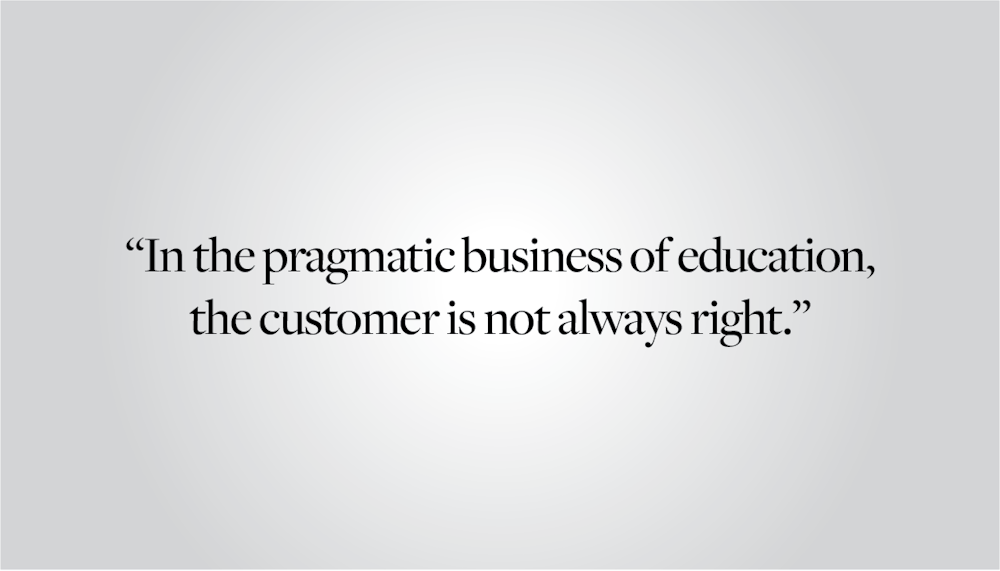The United States is home to many of the world’s leading universities due, in large part, to its culture of free inquiry. Increasingly, this culture has been eroded as universities neglect their unwritten obligation to safeguard academic freedom. We ought to do more to protect the diversity of views that make education worthwhile.
Last year, an adjunct professor of art history at Hamline University was let go for lecturing on a famous 14th-century Persian manuscript painting depicting the Prophet Muhammad after one Muslim student who was in the class complained. Despite students receiving advance warnings in the syllabus and during the class that the images would be studied, Hamline officials declined to renew her contract. In emails to the community, administrators called the incident “undeniably inconsiderate, disrespectful and Islamophobic” and stated that respect for Muslim students “should have superseded academic freedom.” This is despite the fact that many Muslims do not find such representations offensive and even revere them.
At New York University, an adjunct professor of organic chemistry, a highly respected lecturer who wrote a textbook on the subject, also lost his contract after students deemed his class too difficult. The university further allowed students to retroactively drop his class following the semester’s completion in order to “extend a gentle but firm hand to the students and those who pay the tuition bills.”
Up the road in Cambridge, the dean of the Harvard Kennedy School blocked Kenneth Roth, longtime executive director of Human Rights Watch, from receiving a fellowship at the Carr Center for Human Rights Policy. This was due to claims of anti-Israeli bias at the human rights organization. He similarly blocked Chelsea Manning’s appointment in 2017 after the resignation of another fellow at the school with decades of CIA experience and pushback from then-CIA Director Mike Pompeo.
The list goes on.
In each of these cases, one must ask, who benefits from such infringements?
Surely not students, who are denied the opportunity to learn a heterodox perspective on Islamic art, to take a challenging chemistry class taught in a novel way or to learn from one of the world’s most preeminent human rights advocates. Nor the world at large, deprived of the knowledge or truth that might stem from such public or private discourse.
And therein lies the root of the problem — in a misguided attempt to make universities more accommodating of students, administrators actually cheapen the education that students receive.
Academic freedom should be at the heart of everything a university does. But today, this is often not the case. As discussed above, today’s administrators feel empowered to inappropriately regulate course dynamics and departmental proceedings. One reason for this is due to the shifting nature of higher education funding, in which universities facing growing costs increasingly rely on tuition dollars to raise revenue. This has led to the commodification of higher education where students see themselves as consumers and education as a means to an end and not an end in itself. Furthermore, to cut costs, universities increasingly rely on adjunct faculty who, without the protection of tenure, feel the need to play it safe. Thus it is no surprise that we see administrators so keen on avoiding controversy, and so adamant to shelter their students.
Yet this runs contrary to the mission and values of universities.
Academia is, inherently, a controversial enterprise. It is simply impossible to cater to everyone’s each and every whim, nor should we attempt to. Just as it would be ludicrous to refrain from teaching evolution or family planning in medical schools in the name of religious tolerance, it is equally reprehensible to punish an art historian for leading a nuanced conversation on a masterpiece in Islamic art. Further, we should not demand that professors reward students who are unwilling to put in the work for a class. And academic freedom doesn’t matter just for its own sake — its reverberations expand into the world beyond college. When educating the doctors, scientists and leaders of tomorrow, there is simply too much at stake. In the pragmatic business of education, the customer is not always right.
We live in an age of book bans and states determining what teachers can and cannot teach. In light of these concerning developments, we should not shy away from controversy but rather embrace it. As stated in a 1974 report from the Committee on Freedom of Expression at Yale, “the history of intellectual growth and discovery clearly demonstrates the need for unfettered freedom, the right to think the unthinkable, discuss the unmentionable and challenge the unchallengeable.” A university in which students and faculty do not feel comfortable to question and be questioned is not one worth attending. It’s time for universities to do their part and safeguard academic freedom in all its forms.

Tas Rahman is a staff columnist at the Brown Daily Herald writing about issues in higher education. When he's not coding or studying biochemistry, you can find him hiking and enjoying the great outdoors.





